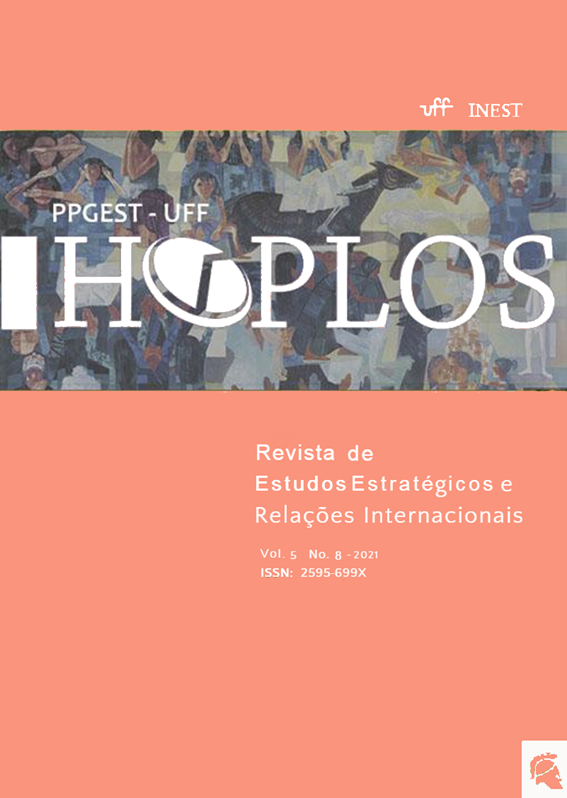AS RAÍZES DA INTEGRAÇÃO EUROPEIA NA GEOESTRATÉGIA DOS ESTADOS UNIDOS DE CONTENÇÃO AO COMUNISMO SOVIÉTICO NA GUERRA FRIA (1947-53)
Mots-clés :
Integração, Europa, Estados Unidos, Geoestratégia, Guerra FriaRésumé
Este artigo objetiva investigar as raízes do processo de integração da Europa, ocorrido na segunda metade do século XX, na reconstrução da ordem internacional no pós-guerra sob a liderança incontestável pelos Estados Unidos. Para isso, adotamos metodologia histórico-dedutiva fundamentada numa revisão bibliográfica acerca do tema e do período histórico considerados. Com efeito, a investigação revelou que, nas suas origens, a integração europeia resultou de uma convergência histórica entre os interesses dos dirigentes europeus em promover a reconciliação entre os seus países, principalmente França e Alemanha, controlando a última através da Europa integrada, com os interesses estadunidenses em reconstruir os países europeus sob a sua influência com vistas a fortalecer a sua posição diante do avanço do comunismo soviético. Não obstante, concluímos que, em que pesem as intenções e planos preexistentes de integração, particularmente pelos franceses, a geoestratégia dos Estados Unidos nos primórdios da Guerra Fria foi o elemento decisivo que possibilitou as suas iniciativas iniciais, pois naquele contexto apenas a superpotência ocidental reunia os recursos materiais, financeiros e políticos necessários para viabilizá-la.
Téléchargements
Références
BESSEL, Richard. Alemanha, 1945. São Paulo: Companhia das Letras, 2010.
DELGADO, Nelson G. O regime de Bretton Woods para o comércio mundial: origens, instituições e significado. Rio de Janeiro: Mauad X; Seropédica (RJ), EDUR, 2009.
EICHENGREEN, Barry J. A globalização do capital: uma história do sistema monetário internacional. São Paulo: Editora 34, 2012 (2ª Edição).
EICHENGREEN, Barry J. Privilégio Exorbitante: a ascensão e queda do dólar. Rio de Janeiro: Campus / Elsevier, 2011.
FIORI, José Luis. O Poder Americano. Petrópolis: Editora Vozes, 2005.
IRVING, Ronald. Adenauer. London: Pearson Education, Limited., 2002.
JUDT, Tony. Pos-Guerra: uma história da Europa desde 1945. Rio de Janeiro: Objetiva, 2007.
KEYNES, John Maynard. As Consequências Econômicas da Paz. São Paulo: Imprensa Oficial do Estado; Brasília: Editora Universidade de Brasília, 2002.
KOSINSKI. Daniel S. A moeda como meio de comando: a Alemanha e a integração monetária europeia. Tese de Doutorado apresentada ao Programa de Pós-Graduação em Economia Política Internacional (PEPI) da Universidade Federal do Rio de Janeiro. 2019. 319f.
MARSH, David. The Bundesbank: the bank that rules Europe. London: Mandarin Publishers, 1993.
MAZOWER, Mark. Continente Sombrio: A Europa no século XX. São Paulo: Companhia das Letras, 2001.
MILWARD, Alan S. The European rescue of the nation-state. Park Square, Milton Park, Abingdon, Oxon (UK): Routledge, 2nd Edition, 2000.
MILWARD, Alan S.; SORENSEN, V. Interdependence or integration? A national choice. In:
MILWARD, Alan S. The Frontier of National Sovereignty: history and theory, 1945-1992. London (UK): Routledge, 1994.
MONNET, Jean. Memórias - a Construção da Unidade Europeia. Brasília: UNB, 1986.
MUNDELL, Robert. A Theory of Optimum Currency Areas. American Economics Review, n° 51, 1961, p. 509-517.
OVERY, Richard (Ed.). The Times Atlas of the 20th Century. London: Times Books, 1996.
PADULA, Raphael. Integração regional de infra-estrutura e comércio na América do Sul nos anos 2000: uma análise político-estratégica. Tese de Doutorado apresentada ao Programa de Pós-graduação em Engenharia de Produção (COPPE) da Universidade Federal do Rio de Janeiro. 2010. 302f.
PETROV, Vladimir. Money and Conquest: Allied Occupation Currencies in World War II. Baltimore: The Johns Hopkins Press, 1967.
PRICE, Roger. A Concise History of France. Cambridge: Cambridge University Press, 1993.
RHODES, Richard. The making of the atomic bomb. New York (USA): Touchstone, 1986.
ROLFE, Sidney E.; BURTLE, James L. O Sistema Monetário Mundial: uma reinterpretação. Trad. Fernando Castro Ferro. Rio de Janeiro: Zahar Editores, 1981. “A Ascensão e Queda do Sistema de Bretton Woods”, pp. 81-123.
STRANGE, Susan. States and Markets. London e New York: Continuum, 1994.
UNIÃO EUROPEIA. A Declaração Schuman de 9 de maio de 1950. Disponível em: https://europa.eu/european-union/about-eu/symbols/europe-day/schuman-declaration_pt. Acesso em: 21 out. 2018.
Téléchargements
Publié
Numéro
Rubrique
Licence
© Daniel Kosinski 2021

Cette œuvre est sous licence Creative Commons Attribution - Pas d'Utilisation Commerciale - Partage dans les Mêmes Conditions 4.0 International.
1. PROPOSTA DE POLÍTICA PARA PERIÓDICOS DE ACESSO LIVRE
Autores que publicam nesta revista concordam com os seguintes termos:
a. Autores mantém os direitos autorais e concedem à revista o direito de primeira publicação, com o trabalho simultaneamente licenciado sob a Licença Internacional Creative Commons Attribution - Share Alike 4.0 que permite o compartilhamento do trabalho com reconhecimento da autoria e publicação inicial nesta revista.
b. Autores têm autorização para assumir contratos adicionais separadamente, para distribuição não-exclusiva da versão do trabalho publicada nesta revista (ex.: publicar em repositório institucional ou como capítulo de livro), com reconhecimento de autoria e publicação inicial nesta revista.
c. Autores têm permissão e são estimulados a publicar e distribuir seu trabalho online (ex.: em repositórios institucionais ou na sua página pessoal) a qualquer ponto antes ou durante o processo editorial, já que isso pode gerar alterações produtivas, bem como aumentar o impacto e a citação do trabalho publicado (Veja O Efeito do Acesso Livre).






